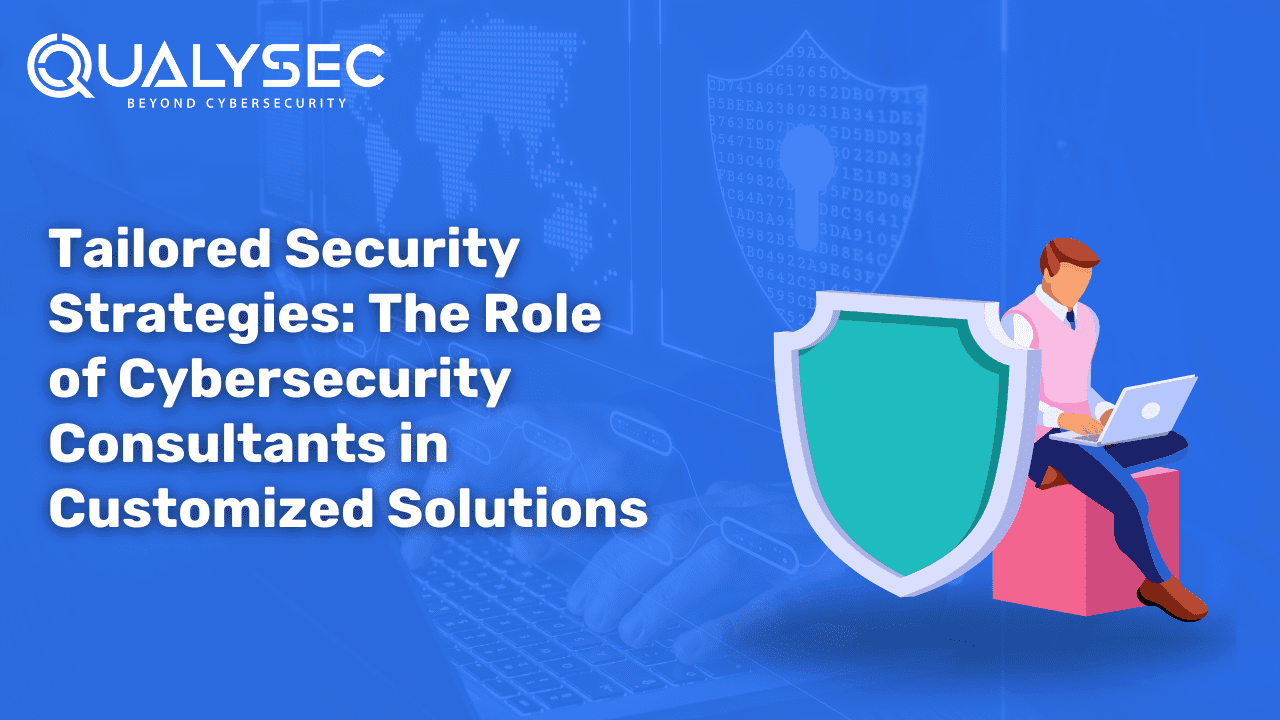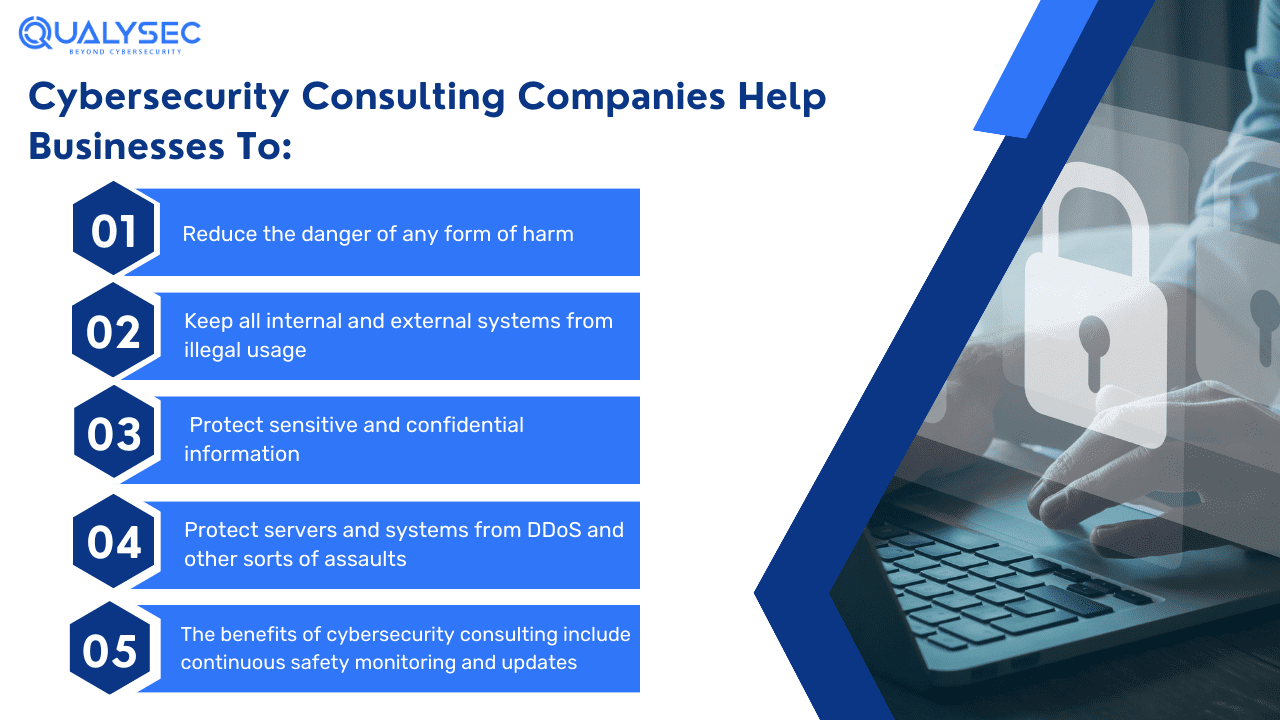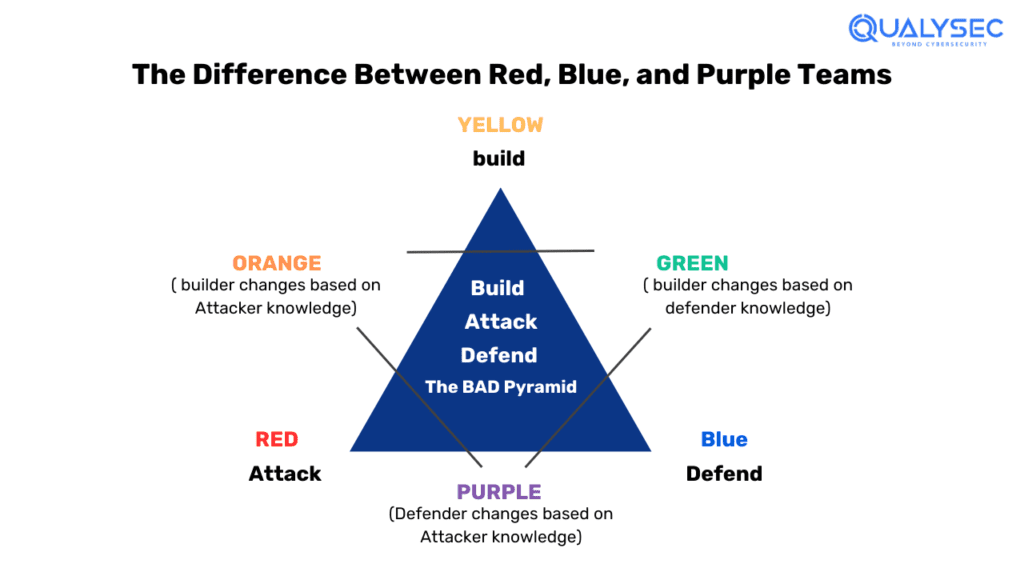© 2024 Qualysec.com Disclaimer Privacy Policy Terms & Conditions

The guards of our digital borders have become crucial in the age of digital transformation when the virtual and real worlds combine. Cybersecurity consultant services, formerly considered a niche industry, have risen to the forefront of protecting our linked world.
As cyber threats become more sophisticated, the demand for these professionals has increased, making their position more important. Here are some eye-opening stats you should know about:
All of this demonstrates that cybersecurity consultant services are as important as ever.
This blog will discuss cybersecurity consultants, their importance, roles, responsibilities, types of consulting services, and how businesses could get help from them. Keep reading to be safe and secure.
Cybersecurity consulting is a booming sector, valued at $156.5 billion in 2019. The cybersecurity sector is expected to rise from USD 190.5 billion in 2023 to USD 208.8 billion by 2024, representing a ~10% year-on-year increase.
It refers to the corporations, companies, and individuals who operate in the cybersecurity industry. They assist organizations of all sizes and sectors in analyzing, testing, and updating their security systems.
Cybersecurity consultant services may also assist with data protection regulatory compliance. These services are required to update the system, stay current with new threats, and avoid hazards. Instead of dealing with repercussions, top cybersecurity consulting firms always take a proactive approach and prioritize prevention.

Professionals employ cybersecurity consultant services and cutting-edge technologies to establish best-practice enterprise security measures. You’ll learn in-depth below in this blog.
So, other than being technological geniuses, what does the job of a cyber essential consultancy entail? It’s a broad profession that requires a variety of talents, including the ability to operate effectively as part of a team to secure firms’ networks against cyber threats and assaults.
This position requires someone with technical competence and interpersonal abilities to work throughout the business on troubleshooting, testing, and network enhancements. These experts are security architects who combine technology solutions with strategic thought.
A cybersecurity consultant’s function varies based on the business they work with. However, some frequent roles include the following:
Read More : Penetration Testing in Cybersecurity
The consulting team serves as your organization’s external third-party cyber security expert, giving guidance and assistance as needed. Cybersecurity consultancy can be useful in the following scenarios:
With an engagement with Cybersecurity Consultant Services, companies can maintain various skill sets in-house to access it. The consulting team can act as part of your in-house team, adding value where required and giving you access to a committed pool of specialists specializing in solving the complicated cybersecurity problems you may be facing and delivering practical recommendations based on security best practices aligned with industry standards. To know more, schedule a call with experts now!
The cybersecurity squad is built on three teams: red, blue, and purple. Their key responsibilities include simulating real-world security threats, detecting vulnerabilities, improving information security, and strengthening defenses.

However, it is far more than that. Continue reading to learn more about how each contributes to the security process.
The blue security team, which represents the cyber risk consultant team’s defensive side, often takes a proactive approach to combating security threats. They use Security Information and Event Management (SIEM) platforms to monitor suspicious activities, trace network traffic, and enforce strict security policies for mitigation.
The blue team conducts a thorough risk assessment to detect threats and vulnerabilities, estimate their impact on vital data and resources, and prioritize which assets require comprehensive protection. Once this is completed, they assist staff in implementing security processes, tight password requirements, and monitoring tools for access management.
The red security team tests an organization’s threat detection, penetration testing, and incident response capabilities. Once they have identified security weaknesses in the system, they launch attacks by mimicking threat actors’ tactics, tools, and procedures (TTP).
Once the red team has completed testing, they will create a thorough report explaining the methodologies used to discover vulnerabilities and how bad actors may exploit them. The red security team aims to determine if the organization’s security measures are rapid enough to detect and respond to new and sophisticated cyber security threats.
Generally, the red team uses an intelligence-driven, black-box methodology to comprehensively evaluate the organization’s threat detection and incident response capabilities. The procedure contains three critical components, namely:
The red team uses high-quality intelligence methods, methodologies, and resources to obtain real-time insights into the desired organization’s security posture. This covers information about the infrastructure, current technology, and staff. A strategy of assault is then implemented.
The team provides hybrid data security consulting services (i.e., automated and manual) based on business requirements and security standards. This novel technique enables a comprehensive investigation of possible vulnerabilities across several domains. The testers undertake penetration testing manually, resulting in no false positives.
After finishing the exercise, a thorough report includes information on security vulnerabilities, attack vectors used, and suggestions for threat mitigation. Click below to download a sample report and get insights into how pentesters work.
The red team’s efforts continue beyond the first discovery stage, including retesting and remediation. The additional advantages of the Red security team include:
Despite having the same aim of improving organizational security, the red and blue teams often work in separate silos. This precludes both teams from exchanging methodologies, data, research, or any other useful insights necessary to better the security posture. As a result, security drills need to be more effective.
Here’s where the purple team comes in. The purple security team puts the red and blue teams together to work as a unified entity, improve security, and share resources, insights, and reporting. To do this, the purple team encourages a culture of communication and collaboration between the red and blue teams.
Also Read : Everything about Pen Testing Types: Network, Web App, and More
As cyber dangers evolve, it becomes more difficult to defend against them. Attackers utilize different strategies to acquire insight into an organization’s operations and target firms that support their goals.
Successful cyberattacks can result in enormous financial losses, reputational harm, and legal ramifications. To reduce these risks, cybersecurity awareness has emerged as an essential tool for enterprises. Here are some of the main reasons why a cybersecurity solution provider is important:
Data breaches, phishing attacks, and social engineering assaults are all examples of cybersecurity dangers that can cause considerable financial loss and jeopardize sensitive information. Cybersecurity awareness training provides personnel with the information and skills to recognize and respond correctly to such risks, lowering the chance of successful assaults.
Compliance regulations for information security, such as GDPR and HIPAA, highlight the need for awareness training. These requirements require the deployment of appropriate security controls. Cybersecurity awareness training assists firms in meeting these compliance obligations by ensuring that workers understand their roles and responsibilities in safeguarding sensitive information.
Human error is a major source of cybersecurity breaches, with employees frequently inadvertently jeopardizing security through their actions. Employee behavior may be changed through cybersecurity awareness training, which promotes a security culture and provides training modules that address frequent mistakes and recommended practices for information security.
Cybersecurity breaches may cause financial losses, a loss of customer trust, and a tarnished brand, as well as jeopardize sensitive data. Organizations must take proactive steps to avoid these threats and safeguard their image.
To begin cybersecurity awareness training, you must first understand the many cyber dangers that may harm your firm. Below are some of the most prevalent cyber threats:
The different responsibilities of a cyber security advisory are:
Businesses and people alike face cybersecurity risks to their internet systems or networks. The primary responsibility of cybersecurity consulting companies is to detect and prevent these attacks. In addition, the many tasks of a Cybersecurity Consultant Services include:
Qualysec stands out as the top choice for cybersecurity consultant services because of its consistent dedication to providing specialized and effective solutions that match each client’s specific demands. Our hybrid approach to cybersecurity distinguishes us, which combines cutting-edge technology with a staff of highly qualified people who keep ahead of emerging threats. Our services include:
When you choose Qualysec, you don’t just get a one-size-fits-all solution; you get a partner who takes the time to understand your unique difficulties, analyze your vulnerabilities, and develop tailored methods to strengthen your defenses.
We offer customized solutions per your security requirements with our expert pen testing consultancy ready to assist in finding and creating a comprehensive report. Our report helps developers to find ways to mitigate it.
Businesses get benefits when they choose process-based penetration testing services. We at Qualysec are India’s only IT security consulting firms that follow process-based pentesting solutions. Your asset security is in safe hands.
If you want an instant connection, connect with us today. Stay safe, stay secure.
To summarize, the dynamic and ever-changing world of cybersecurity needs bespoke security methods. Cyber security business consulting plays an important role in developing customized solutions.
As firms confront more complex cyber threats, a one-size-fits-all strategy is no longer enough. Cybersecurity consultants bring much experience, assisting firms in assessing their unique risks and developing tactics tailored to their requirements.
Cybersecurity Consultant Services may build comprehensive and adaptable security solutions by knowing each organization’s activities, infrastructure, and risk tolerance. Furthermore, their ongoing monitoring and proactive attitude guarantee that security policies are effective in the face of growing threats.
In the digital era, when data is a valuable asset, investing in the knowledge of cybersecurity experts is more than a strategic choice; it is a critical component for protecting enterprises’ integrity and resilience against an ever-expanding range of cyber hazards. Contact Qualysec Today!
Cybersecurity consulting involves providing expert advice and services to organizations to assess, design, and implement effective security measures. Consultants analyze and address vulnerabilities, offering tailored solutions to protect digital assets and sensitive information from cyber threats.
The primary responsibility of a cybersecurity consultant is to assess an organization’s security posture, identify vulnerabilities, and develop strategies to mitigate risks. This includes implementing protective measures, conducting security audits, and ensuring compliance with industry regulations to safeguard against potential cyber-attacks.
A security consultant assesses and enhances overall security for a business. This involves evaluating physical and digital risks, implementing security protocols, and advising on measures to protect assets. Security consultants may specialize in various areas, including information security, personnel safety, and technology infrastructure, tailoring their expertise to meet the client’s specific needs.
While both roles involve safeguarding assets, a security consultant addresses a broader spectrum of security concerns, including physical safety. In contrast, a cybersecurity consultant specifically focuses on protecting digital assets from cyber threats. Cybersecurity consultants specialize in securing information systems, networks, and data against hacking, unauthorized access, and other online risks.





Plot No:687, Near Basudev Wood Road,
Saheed Nagar, Odisha, India, 751007
No: 72, OJone India, Service Rd, LRDE Layout, Doddanekundi, India,560037
© 2024 Qualysec.com Disclaimer Privacy Policy Terms & Conditions


No: 72, OJone India, Service Rd, LRDE Layout, Doddanekundi, India,560037
© 2024 Qualysec.com Disclaimer Privacy Policy Terms & Conditions